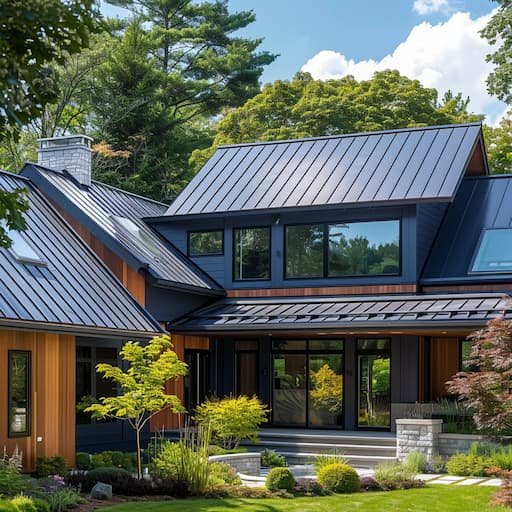In recent years, metal roofing has surged in popularity among homeowners looking for durable, long-lasting, and aesthetically pleasing roofing options. This blog explores the benefits of metal roofing, providing insights into why this roofing material might be the right choice for your home. Additionally, we’ll address some downsides to give you a well-rounded view.

The Benefits of Metal Roofing:
- Durability and Longevity: Metal roofs can last 40-70 years, depending on the material, significantly longer than asphalt roofing, which typically lasts 20-25 years. Metal roofs are also resistant to cracking, shrinking, and eroding, and can withstand extreme weather conditions including heavy snow, hailstorms, and even wildfires.
- Energy Efficiency: Metal roofing reflects solar radiant heat, which can reduce cooling costs by 10-25%. This makes metal roofs highly energy-efficient, helping you save money on energy bills, especially in warmer climates.
- Environmental Sustainability: Metal roofs are made from 30-60% recycled material and are 100% recyclable at the end of their life. This reduces the environmental impact compared to other roofing materials that contribute to landfill waste.
- Safety: Metal roofing is fire resistant, which can provide an additional layer of safety for your home. They will not spark and ignite into flames during a wildfire or lightning strike.
- Maintenance: Compared to other roofing materials, metal roofs require minimal maintenance. This can save homeowners time and money over the life of the roof.
- Aesthetic Variety: Metal roofing comes in a variety of styles, colors, and finishes. Whether you have a traditional, contemporary, or even colonial-style home, there’s a metal roofing style to match.
- Performance in Extreme Weather: Metal roofs are built to withstand decades of abuse from extreme weather like high winds, heavy snow, hailstorms, and even hurricanes.
Downsides of Installing a Metal Roof:
While the benefits of metal roofing are compelling, it’s essential to consider a few potential downsides before making a decision:
- Cost: The initial cost of a metal roof can be higher than other roofing materials. However, considering the durability and longer lifespan, a metal roof can be more cost-effective in the long run.
- Noise: Without proper insulation, metal roofs can be noisier than other roofs, especially during heavy rain or hail. However, noise can be significantly reduced with proper insulation materials.
- Denting: Although metal roofs are highly durable, certain types can dent if hit with a significant impact, such as large hailstones. Materials like copper and aluminum are softer and more prone to denting, while steel is typically more resistant.
- Expansion and Contraction: Metal roofing materials can expand and contract. If they are not properly installed with fasteners that allow the metal to “breathe,” the panels may loosen.
- Modifications: Modifying a metal roof after installation can be difficult and expensive. For example, adding a vent, chimney, or making structural changes might require professional assistance to ensure the integrity of the roof is maintained.
The benefits of metal roofing make it an attractive option for many homeowners, offering durability, energy efficiency, and an array of aesthetic options. While there are some downsides, such as initial cost and potential for noise, these can often be mitigated through proper installation and insulation. As with any significant home improvement decision, weighing the pros and cons is crucial. For those considering a metal roof, the long-term benefits of durability, sustainability, and energy savings make it a compelling choice.
Check our our metal roofing services here
For more information on metal roofing, check out the Metal Roofing Alliance

0 Comments